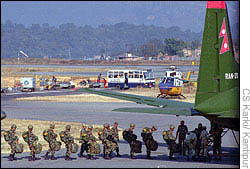 Let us be perfectly clear about this: the Maoists brought this on themselves. They willfully took the "people's war" to the next phase to bring down this country's constitutional monarchy and parliamentary democracy. While there may have been a few other options, it is clear why the elected government decided declare a state of national emergency.
Let us be perfectly clear about this: the Maoists brought this on themselves. They willfully took the "people's war" to the next phase to bring down this country's constitutional monarchy and parliamentary democracy. While there may have been a few other options, it is clear why the elected government decided declare a state of national emergency. By breaking the truce and the talks to attack the Royal Nepal Army last Friday, the Maoists knew exactly what they were getting into. They must have foreseen how the government would respond, they must have known it would plunge the country into civil war. And yet they went ahead and did it. Why?
It was either an exaggerated sense of their own strength and a complete mis-reading of regional geopolitics. Or, it indicates a deep-seated division in the leadership in which the hardliners now have the upper hand, and the cadre have run away with the agenda.
Either way, the country is now in it for the long haul, and the long-awaited (and feared) clash between insurgents and soldiers is a reality. All indications from the first week of army action are that after Dang, where the RNA was caught napping, the Maoist rank-and-file is now taking a heavy beating.
As repeated often, the killing of Nepalis by Nepalis cannot be a victory for anyone. But that is exactly what the Maoists were doing these past years, and now the tables may turn. The Royal Nepal Army, which has held its fire for so long, now has the difficult job of bringing this campaign to a swift, effective and conclusive end with the least amount of Nepali blood shed. The focus of this campaign must clearly be to disarm the rebels and get them to surrender, rather than to eliminate them. The army can only neutralise the Maoists, it cannot solve the "Maoist problem". Even though they went for armed struggle, the Maoists' is still in essence a political cause. A defanged Maoist movement is the best bet that the party will enter the political mainstream, as it should. There has always been space for their ideology in the parliamentary arena.
Impatient for power, the Maoists took a violent short-cut rather than go the long- distance marathon of political organisation. They decided on a re-run of the Shining Path in the Himalaya. During the past four months of truce, they also realised that there is a lot else that comes out of the barrel of a gun: criminalisation of a once-valid struggle, erosion of discipline, lack of command and control, and a serious danger of internecine violence.
Emergencies are not pretty. In 1975-77, Indian democracy suffered one as Indira Gandhi and her son Sanjay used it to try and rid the country of all its ills: the Naxalites were mowed down in West Bengal, trains ran on time, and there were forced vasectomies. It is important to understand that unlike the socialist Jayaprakash Narayan and others who Indira had it in for, Sher Bahadur Deuba's emergency is directed solely at the Maoists. It must also be said that Indian democracy has still not recovered from those years.
Here in Nepal, civil society, media, human rights organisations and the intelligenstia must understand this if they are to be true monitors of the Nepali Emergency just begun: they can guard against its possible misuse. This is a test for our institutions: parliament, government, monarchy, judiciary, bureaucracy, army and police. It will be the alertness of media and civil society that will ensure democracy emerges stronger from this test so it can at last deliver socio-economic development to all Nepalis.


